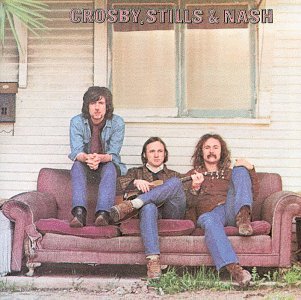Stephen Stills bands defined 'Supergroup'
+prauls.jpg) Stephen Stills guitar work on the Buffalo Springfield's "Bluebird" awakened a generation that acoustic guitar on a rock song could be melodic and beautiful. Yet when Stills played his famous wah-wah guitar break on Donovan's "Season Of The Witch," he played one of the decade's most famous solos. Photo shot on stage in San Antonio in 1971 by (c) Phillip Rauls.
Stephen Stills guitar work on the Buffalo Springfield's "Bluebird" awakened a generation that acoustic guitar on a rock song could be melodic and beautiful. Yet when Stills played his famous wah-wah guitar break on Donovan's "Season Of The Witch," he played one of the decade's most famous solos. Photo shot on stage in San Antonio in 1971 by (c) Phillip Rauls.But the project didn't come without a fight. As the story goes, a young talent agent from The William Morris Talent Agency named David Geffen had approached the label with the intent of a obtaining a release of Stephen Stills' contract. Geffen, manager to Stills and several other prominent artist, demanded that his terms be met when he threatened to take his artist to Columbia Records. This didn't sit well with the Atlantic brass whereas the label apparently had Stills' rock group, The Buffalo Springfield still under an existing contract. Well, after a shouting match ensued between Geffen and Atlantic's Jerry Wexler, Geffen was promptly shown the door. And via Wexler's boot. Startled employees were peeking from behind doors when Ahmet Ertegun intervened and safely secured Geffen's solicited project. And rightly so, as the band contained members from The Byrds, The Hollies and Stills' Buffalo Springfield.
Patched-up, re-fragmented and joined at the microphone, Crosby, Stills and Nash were now Atlantic's newest group. Their debut album released in the summer of 1969 was arguably the one of the best releases of the decade and presented to an audience growing old to a dwindling psychedelic scene. Not truly certain of the impact that this vocal trio would have on an ever-changing radio market, Atlantic would soon bask in the limelight from this timely signing. Crosby, Stills and Nash acoustical arraignments complimented with their self-penned enduring songs quickly attracted the medias attention that referred to them as a "Supergroup." That was bold new terminology coming from the traditionally critical music press but Atlantic had scored big time and was destined for a conquest of label domination. Powerful songs like "Suite: Judy Blue Eyes", "Marrakesh Express" and "Long Time Gone" would blanket the airwaves on both AM and FM formants by their pleasant compositions. Radio embraced the music of Crosby, Stills and Nash as it reached the coveted mass appeal audience.
Imagine being a promotion man for Atlantic Records and going into a radio station representing Crosby Stills and Nash, The Allman Brothers Band and Eric Clapton's latest release by Derek and The Dominos. Always supported by the fact that I was treated with professional respect, I might add that radio stations didn't generally greet promotion people with a red-carpet treatment. Most stations had a set of rules whereas station personnel had set aside one day a week when they would interact with record promoters and other than that, or on special occasions, they refrained from making playlist additions. Most stations had policies for record promoters requiring them to book an appointment in advance and having them wait in the lobby until the Program or Music Director is available, then allowing the promoter only a few moments to play their new releases and share information. And then after that, you're done, that's it, your time is over until next week. Believe me, this process could be a royal pain in the butt. But now, with this new release by Crosby, Stills and Nash, plus pivotal albums by Derek and The Dominos and The Allman Brothers Band, the pendulum had finally swung to my advantage. Ah, the sweet sound of redemption.
There's an old saying in the music business: "A promotion man is only as good as his product." Well, let me tell you something. All of a sudden, my briefcase was full of these new blockbuster releases when suddenly I was treated like, 'King of The Hill.' My oh my, what a difference a hit record can make.
 Crosby, Stills and Nash self titled debut LP was in my opinion the most brilliant album ever to be released featuring acoustic guitar and vocal harmonies. Stephen Stills perfection of the Martin guitar is high-lighted throughout this splendid album.
Crosby, Stills and Nash self titled debut LP was in my opinion the most brilliant album ever to be released featuring acoustic guitar and vocal harmonies. Stephen Stills perfection of the Martin guitar is high-lighted throughout this splendid album. Stephen Stills, often dubbed as a musical genius, was the driving force behind the Buffalo Springfield. His first solo LP which includes the hit single "Love The One You're With" was considered by many as his best work. The album was recorded with help from Booker T. Jones, Eric Clapton and Jimi Hendrix.
Stephen Stills, often dubbed as a musical genius, was the driving force behind the Buffalo Springfield. His first solo LP which includes the hit single "Love The One You're With" was considered by many as his best work. The album was recorded with help from Booker T. Jones, Eric Clapton and Jimi Hendrix.Album cover photos by Henry Diltz


prauls%20001.jpg)